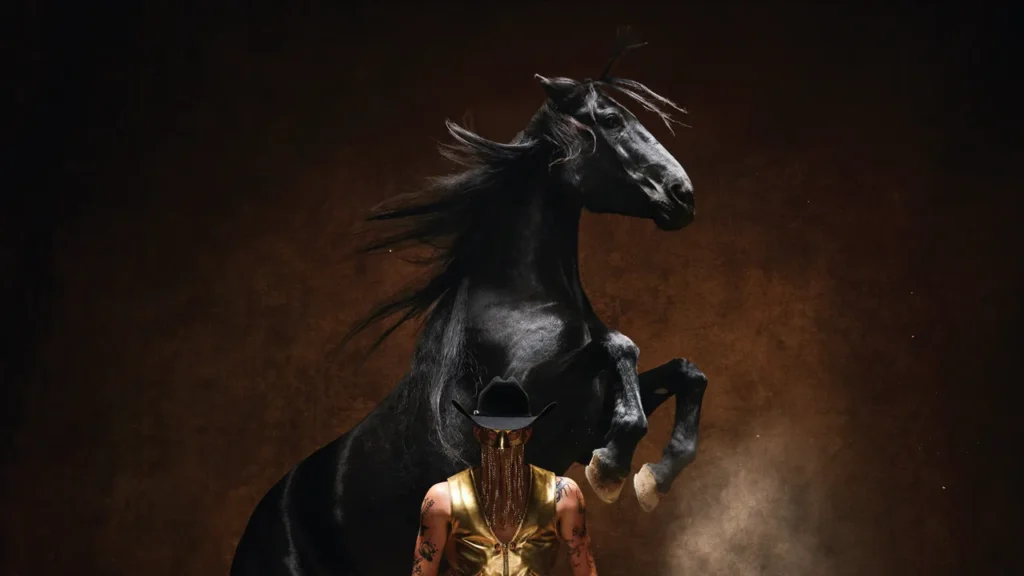In the grand tapestry of rock music, few bands have woven a narrative as compelling and influential as Paramore. Formed in 2004, this emblematic ensemble has become synonymous with raw emotion, innovative soundscapes, and the powerful presence of its frontwoman, Hayley Williams. Their journey through the echelons of the music industry is a testament to their artistic evolution and enduring impact on female-led rock music.
Genesis of a Phenomenon
The inception of Paramore in Franklin, Tennessee, marked the dawn of a new era in rock. Hayley Williams, whose vocal prowess and magnetic stage presence would soon captivate the world, joined forces with brothers Josh and Zac Farro, Jeremy Davis, and Jason Bynum. Their early sound, a potent mix of pop-punk and emo, quickly garnered a fervent following. The formation of the band during their teenage years infused their early music with an authentic sense of youthful exuberance and rebellion.
Paramore’s formation can be traced back to 2002 when Hayley Williams, a young teenager with an extraordinary voice, moved to Franklin from her hometown of Meridian, Mississippi. Her relocation was initially met with resistance and isolation, but it eventually led to a serendipitous meeting with the Farro brothers. The trio’s shared musical interests and chemistry sparked the beginning of what would become Paramore.
Hayley Williams’ arrival in Franklin was not just a geographical move but a significant pivot in her life and career. Her early years in Meridian were marked by a love for music and performance, attributes that set her apart from her peers. The move to Franklin, a place known for its vibrant music scene, was fortuitous. In Franklin, she met the Farro brothers—Josh, a guitarist, and Zac, a drummer. Their initial collaborations were informal jam sessions that quickly revealed a unique synergy among them. Recognizing the potential of their combined talents, they decided to form a band, and thus, Paramore was born.
Their decision to name the band “Paramore” came from the maiden name of a former band member’s mother, which they discovered also meant “secret lover.” This dual meaning resonated with the band, symbolizing both a hidden passion and an intimate connection with their music and audience. This choice of name underscored the band’s intent to create a deep and personal bond with their fans, a relationship that would become a hallmark of their career.

All We Know Is Falling (2005)
Their debut album, All We Know Is Falling, introduced Paramore as a fresh and vibrant force in the rock genre. Released on July 26, 2005, the album was recorded in just three weeks and produced by James Paul Wisner. The album’s themes were heavily influenced by the departure of bassist Jeremy Davis, an event that left a profound impact on the band members. The album’s cover art—a shadow of a band member walking away from a red couch—visually represented this sense of loss and longing.
Tracks like “Pressure” and “Emergency” encapsulated the angst and emotional turmoil of their teenage years. “Pressure,” the lead single, became an instant hit, showcasing Williams’ powerful vocals against a backdrop of energetic guitar riffs and driving drums. The song’s music video, featuring the band performing in a warehouse interspersed with scenes of a young couple under pressure, struck a chord with fans and helped establish Paramore’s visual and musical identity.
“Emergency,” another standout track, addressed themes of personal and relational crises. The rawness of the lyrics, combined with the band’s tight instrumentation, highlighted their ability to translate intense emotions into compelling music. The accompanying music video, set in a hospital, symbolically represented the song’s exploration of emotional wounds and the need for healing.
Despite the modest production and the band’s relative inexperience, All We Know Is Falling laid a solid foundation for Paramore’s future success. It received positive reviews from critics who praised Williams’ vocal abilities and the band’s cohesive sound. The album’s commercial performance, though initially modest, gained momentum through relentless touring and word-of-mouth among fans. This grassroots support would prove instrumental in catapulting Paramore into the mainstream.

Riot! (2007)
Riot!, their sophomore effort, catapulted Paramore into mainstream acclaim. Released on June 12, 2007, the album’s title aptly captured the explosive energy and rebellious spirit that defined this era of the band. Produced by David Bendeth, Riot! showcased a more polished and confident sound, reflecting the band’s growth and maturation.
The album’s breakout single, “Misery Business,” became an anthem for a generation. The song’s candid lyrics, inspired by Williams’ personal experiences, resonated with fans and critics alike. “Misery Business” marked a significant shift in Williams’ songwriting, as she embraced a more confessional and direct approach. The song’s success was amplified by its dynamic music video, featuring the band performing in a high school setting intercut with scenes of teenage drama and rebellion.
Other standout tracks included “That’s What You Get” and “Crushcrushcrush.” “That’s What You Get,” with its infectious melody and relatable lyrics about the consequences of letting your heart guide your decisions, became a fan favorite. “Crushcrushcrush” explored themes of desire and frustration, further showcasing the band’s ability to blend catchy hooks with deeper emotional content.
Riot! was both a critical and commercial triumph. It received widespread acclaim for its energetic and polished sound, as well as Williams’ powerful and emotive vocals. The album debuted at number 20 on the Billboard 200 and was certified platinum in several countries. The success of Riot! solidified Paramore’s status as one of the leading bands in the rock genre and established Williams as a prominent female voice in the industry.

Brand New Eyes (2009)
With Brand New Eyes, Paramore delved into more introspective and mature themes. Released on September 29, 2009, the album reflected a period of personal and professional turmoil for the band. The departure of guitarist Josh Farro during the album’s creation brought significant challenges but also led to some of their most profound and poignant work.
The album’s lead single, “Ignorance,” addressed themes of betrayal and frustration, capturing the tension within the band. The song’s aggressive guitar riffs and intense vocals showcased a raw and unfiltered emotional landscape. The music video, featuring the band performing in a confined space illuminated by a single light bulb, visually mirrored the song’s claustrophobic and confrontational tone.
“The Only Exception,” a departure from their typical high-energy sound, was a heartfelt ballad exploring themes of love and vulnerability. The song’s stripped-down arrangement and Williams’ tender vocals highlighted the band’s versatility and willingness to experiment with different musical styles. The accompanying music video, which depicted Williams navigating a series of romantic and familial scenes, added a visual narrative that complemented the song’s emotional depth.
Other notable tracks included “Brick by Boring Brick” and “Playing God.” “Brick by Boring Brick” used fairy tale imagery to explore themes of escapism and disillusionment, while “Playing God” addressed issues of control and judgment. Both songs demonstrated the band’s ability to tackle complex and multifaceted subjects with nuance and artistry.
Brand New Eyes received critical acclaim for its lyrical maturity and sonic diversity. The album debuted at number two on the Billboard 200 and was certified gold in multiple countries. The introspective and emotionally charged nature of the album resonated with fans, further solidifying Paramore’s reputation as a band capable of evolving and growing with their audience.

Paramore (2013)
The self-titled Paramore marked a significant transformation for the band. Released on April 5, 2013, the album was their first as a trio following the departure of the Farro brothers. This period of transition and reinvention was reflected in the album’s eclectic and adventurous approach.
The album’s lead single, “Now,” signaled a new direction for the band with its anthemic chorus and experimental production. The song’s lyrics, which spoke of resilience and determination, resonated with both longtime fans and new listeners. The music video, featuring a dystopian battle scene, visually underscored the song’s themes of struggle and perseverance.
“Ain’t It Fun,” another standout track, became one of Paramore’s most successful singles. The song’s upbeat and funky rhythm, combined with its insightful lyrics about the realities of adulthood, showcased the band’s ability to blend catchy pop elements with deeper thematic content. The song’s music video, which featured the band breaking various world records, added a playful and humorous dimension to the song’s message.
“Still Into You,” a bright and infectious love song, further demonstrated the band’s versatility. The song’s catchy melody and heartfelt lyrics made it a favorite among fans, and the music video’s whimsical visuals added to its charm. Other notable tracks included “Daydreaming,” which explored themes of longing and aspiration, and “Last Hope,” a deeply introspective and hopeful ballad.
Paramore received widespread acclaim for its bold and innovative sound. The album debuted at number one on the Billboard 200 and was certified platinum in several countries. Critics praised the band’s willingness to experiment and evolve, as well as Williams’ dynamic vocal performance. The success of the self-titled album reaffirmed Paramore’s status as one of the most influential and enduring bands in modern rock.
After Laughter (2017)
After Laughter was a bold departure from Paramore’s signature sound, embracing a vibrant, 80s-inspired pop aesthetic. Released on May 12, 2017, the album marked a significant shift in the band’s musical direction. Produced by Justin Meldal-Johnsen and Taylor York, After Laughter showcased a more polished and sophisticated sound while retaining the emotional depth that had become a hallmark of Paramore’s music.
The album’s lead single, “Hard Times,” captured the essence of this new era with its infectious melody and upbeat rhythm. Beneath the song’s bright exterior, however, lay themes of struggle and resilience. The song’s music video, featuring colorful and surreal visuals, reflected the juxtaposition of the song’s cheerful sound and its more somber lyrical content.
“Fake Happy,” another standout track, explored themes of facade and emotional vulnerability. The song’s bouncy and cheerful melody contrasted with its introspective lyrics, creating a poignant commentary on the pressures of maintaining a positive exterior in the face of internal turmoil. The music video, featuring Williams wandering through a city with a painted smile, visually captured the song’s exploration of authenticity and facade.
Other notable tracks included “Rose-Colored Boy” and “Told You So.” “Rose-Colored Boy” addressed themes of optimism and disillusionment, while “Told You So” explored feelings of vindication and self-assurance. Both songs showcased the band’s ability to blend catchy pop elements with deeper thematic content.
After Laughter received widespread critical acclaim for its bold and innovative sound. The album debuted at number six on the Billboard 200 and was praised for its production quality and lyrical depth. Critics highlighted the band’s ability to reinvent themselves while maintaining their core essence, as well as Williams’ dynamic vocal performance. The success of After Laughter reaffirmed Paramore’s status as one of the most influential and enduring bands in modern rock.
This Is Why (2023)
Returning after a significant hiatus, Paramore’s This Is Why reflects a band at the height of their creative powers. Released on February 10, 2023, the album is a mosaic of their varied influences, blending rock, punk, and new wave elements. With tracks like the eponymous “This Is Why” and “Running Out of Time,” the album underscores Paramore’s continued relevance and their commitment to pushing the boundaries of their sound.
The album’s title track, “This Is Why,” serves as a powerful anthem for the band’s return. The song’s driving rhythm and incisive lyrics reflect the band’s renewed sense of purpose and determination. The music video, featuring the band performing in various urban settings, visually captures the song’s themes of resilience and defiance.
“Running Out of Time,” another standout track, explores themes of urgency and self-reflection. The song’s energetic tempo and introspective lyrics highlight the band’s ability to blend dynamic musical arrangements with thoughtful thematic content. Other notable tracks include “The News,” which addresses themes of media and information overload, and “C’est Comme Ça,” which explores themes of change and adaptation.
This Is Why received widespread critical acclaim for its bold and innovative sound. The album debuted at number three on the Billboard 200 and was praised for its production quality and lyrical depth. Critics highlighted the band’s ability to reinvent themselves while maintaining their core essence, as well as Williams’ dynamic vocal performance. The success of This Is Why reaffirmed Paramore’s status as one of the most influential and enduring bands in modern rock.
The Feminine Force in Rock
Paramore’s journey is emblematic of the strides made by female-led bands in rock music. Hayley Williams, with her fearless leadership and dynamic presence, has become an icon for aspiring female musicians. Her influence extends beyond her powerful vocals; she has challenged industry norms and championed female empowerment through her music and public persona.
Williams’ journey in the music industry has been marked by resilience and determination. From her early days in Franklin to her rise as one of the most influential female voices in rock, Williams has consistently broken barriers and defied expectations. Her unapologetic approach to her music and her willingness to address personal and societal issues have made her a role model for women in the industry.
The band’s success has paved the way for a new generation of female-led rock acts, proving that women can lead with authority and authenticity in a genre historically dominated by men. Paramore’s legacy is not just their impressive discography but also their role in reshaping the landscape of rock music to be more inclusive and diverse.

Breaking Barriers and Challenging Norms
From the outset, Hayley Williams and Paramore have confronted and challenged the gender norms of the rock industry. As a young woman fronting a rock band, Williams faced numerous challenges and prejudices. However, her unwavering confidence and undeniable talent allowed her to transcend these obstacles, proving that female musicians could lead with authority and authenticity in a genre historically dominated by men.
Williams’ vocal prowess and stage presence quickly became defining features of Paramore’s identity. Her dynamic performances and emotive delivery captivated audiences and critics alike, earning her recognition as one of the most powerful vocalists in modern rock. Her ability to convey raw emotion and connect with listeners on a deep level set her apart from her peers and established her as a formidable force in the industry.
Paramore’s music also broke new ground in its exploration of personal and societal issues. Williams’ lyrics often delved into themes of self-discovery, empowerment, and resilience, resonating with listeners who found solace and strength in her words. Songs like “Misery Business,” “The Only Exception,” and “Hard Times” addressed issues such as identity, love, and mental health, providing a platform for important conversations and fostering a sense of community among fans.
Empowering a New Generation
The impact of Paramore’s success extends beyond their own career. By breaking barriers and challenging norms, the band has paved the way for a new generation of female-led rock acts. Bands such as PVRIS, Chvrches, and Against the Current have cited Paramore as a major influence, drawing inspiration from Williams’ fearless leadership and the band’s innovative sound.
Williams’ influence extends beyond her role as a musician. As a vocal advocate for mental health awareness and gender equality, she has used her platform to raise awareness and inspire change. Her openness about her own struggles with mental health and her advocacy for self-care and self-acceptance have resonated with fans and fellow musicians alike. By sharing her personal experiences, Williams has helped destigmatize mental health issues and encouraged others to seek help and support.
Paramore’s commitment to inclusivity and diversity has also set a powerful example for the music industry. The band’s willingness to experiment with different musical styles and collaborate with a diverse range of artists has broadened the scope of their influence and demonstrated the importance of embracing new perspectives and ideas. This openness to change and innovation has allowed Paramore to remain relevant and influential in an ever-evolving industry.

Epilogue: The Undying Spirit
As Paramore continues to evolve, their influence remains indelible. Each album, a chapter in their remarkable story, reflects their growth as artists and individuals. Their resilience and innovation serve as a beacon for future generations of musicians. In the grand hall of rock’s history, Paramore stands as a testament to the transformative power of music, led by the unparalleled force of a woman who dared to redefine the genre.
The band’s journey is a testament to their enduring spirit and unwavering commitment to their craft. Through personal and professional challenges, Paramore has consistently emerged stronger and more innovative, pushing the boundaries of their sound and redefining what it means to be a rock band in the modern era.
As they continue to create and perform, Paramore’s legacy will undoubtedly inspire future generations of musicians. Their music, marked by its emotional depth, lyrical honesty, and innovative soundscapes, will continue to resonate with listeners and influence the direction of rock music for years to come. The band’s ability to adapt and evolve, while staying true to their core essence, ensures that their impact on the music industry will be felt for generations.
In conclusion, Paramore’s story is one of resilience, innovation, and empowerment. From their humble beginnings in Franklin, Tennessee, to their rise as one of the most influential bands in modern rock, Paramore has left an indelible mark on the music industry. Through their powerful music and fearless leadership, they have paved the way for a new generation of female-led rock acts and inspired countless fans around the world. As they continue to evolve and create, Paramore’s legacy will undoubtedly endure, serving as a testament to the transformative power of music and the enduring spirit of one of the most iconic bands of our time.









